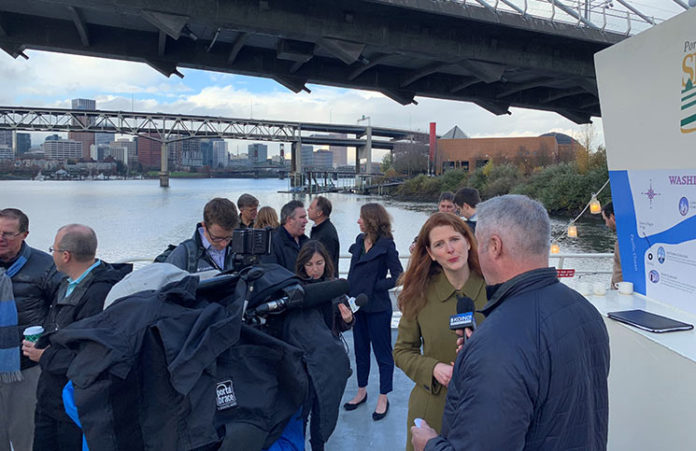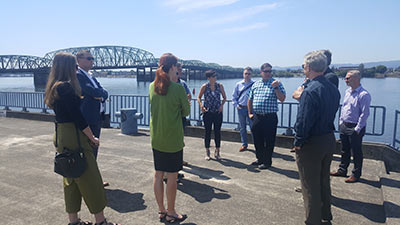
After reading through the Willamette River Ferry Feasibility Study that was conducted back in 2006, Susan Bladholm, founder/president of Friends of Frog Ferry, realized that the Columbia River meets all the requirements that would make it possible to bring a passenger ferry service to the Portland/Vancouver area.
“That’s really what opened up the conversation,” Bladholm said. “A lot has changed (since that study was conducted). I think I’ve had over 200 conversations with people about this in the last 19 months. I’ve been going out to civically minded people in the region, and every conversation was, ‘we love it, how can we help?’ Now, we need to pull together a coalition of people from private and public sectors; get agencies on board like the Port of Vancouver, Columbia River Economic Development Council, etc.”
One of the first agencies to jump on board with the idea of a passenger ferry service was the Port of Vancouver USA.
“Part of my role with the Port as the director of economic development is to look at Terminal 1 and really activate that space as a gathering place,” said Mike Bomar, director of economic development for the Port of Vancouver. “Since our birth in 1912, Terminal 1 was really the birthplace of the Port, and for over 100 years we’ve been about connecting people to the water. It’s an exciting project to work on.”
Bomar said a passenger ferry service could bring a lot of benefits to the entire Vancouver area, especially the new Vancouver Waterfront.
“You look at the waterfront, and you look at the city of Vancouver’s transportation study looking at downtown and the waterfront, the answer is really going to be multi-modal down there,” Bomar said. “You look at the number of residential units planned down there, too, having the options to connect the two most dense urban nodes in the region is really important. It’s one of those modes of transportation that definitely deserves another look.”
The Friends of Frog Ferry’s website, www.frogferry.com, states that the Passenger Ferry Initiative was started to use the river as an alternate transportation option.
“It’s time for Portland to re-examine the option of its waterways to provide an alternate mode of transportation,” the website states. “Using our cities waterways would create an alternative method of transportation. It would provide a pleasing commuter and visitor travel option and increase the livability of our Portland and Vancouver neighborhoods.”
“I think the world’s becoming a smaller place, too,” Bladholm said. “As you’re looking at the bridge and congestion, I think that Vancouver and Portland in some ways are becoming even more siloed from each other. We are one metropolitan region. I think that connectivity within our region and building our region’s economy is a really smart play by all for all of us on both sides of the river. There’s so much going on here in Vancouver that Portlanders don’t really know about. I think there’s a great opportunity for Portlanders to learn more about their region and explore, and it’s a really good conduit for Vancouver.”
Although Bladholm said she does have an estimated ballpark cost in mind, she doesn’t think it’s responsible to confirm exactly what the cost will be to bring a passenger ferry service to the area. There are first several feasibility studies that need to be done, including a demand model (how many people would use this, where would they come from, how would they get there, etc.); a study of the economic, social and environmental impacts; passenger ferry service case studies; and an operational feasibility study.
Bladholm said they will get these feasibility studies this coming fall and will then make an operational plan. From there, during the calendar year 2020, they will then put together a financial plan. She said they will look at federal funding sources, regional funding and local funding. And, even though Bladholm said it’s an “ambitious timeline,” the hope would be to have the ferry service up and running by the summer of 2022.
“When you put it up against other modes of transit, it’s pretty quick,” she said. “For some of these others, it’s a generation away.”
Both Bomar and Bladholm said the community feedback they have received in regards to a passenger ferry service has been very positive.
“There’s been a lot of interest in how it would work,” Bomar said. “There’s been a lot of questions about who’s going to run it, there are a lot of ‘hows.’”
On the Portland side, Bladholm said feedback has been really favorable.

“That has really been the fuel behind this effort,” Bladholm said. “We really don’t have a lot of detractors that we know of. I really think it’s important for us to be prudent with our financial resources, it’s been overwhelming positive. There’s been such broad support behind it.”
“We want to make sure we’re really leveraging that opportunity with the waterfront property and the fact that there’s been so much investment into that area, and it’s beautiful and I think it’s something for Portlanders to come see,” Bladholm said.
Ironically, Bomar pointed out that the Vancouver/Portland area is at the 100-year mark of when the passenger ferry service stopped running.
“It’s interesting how things come back around,” Bomar said. “The ferry service stopped right around the time the I-5 Bridge first opened.”
For more information on the Passenger Ferry Initiative, visit www.frogferry.com.





